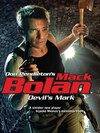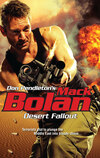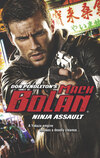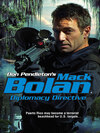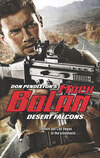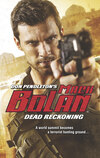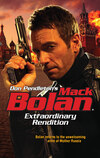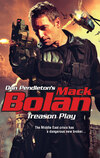Читать книгу: «Devil's Mark», страница 3
“What’s the tong situation like here?” Bolan asked.
“A very good question. Up until the 1950s Chinese actually outnumbered Mexicans in this city. The tongs controlled the opium trade, prostitution and gambling. Now they are a small minority, and, as you might imagine, Mexican brown heroin pushed out China white in the 1980s and the tong control with it. The cartels have pushed the Chinese out of almost all organized crime except that which the Chinese commit against one another. Though they do a brisk business in specialty Chinese brothels, gun-running and gambling.”
“What kind of gambling?”
“Mostly dog and cock fighting.” Villaluz shook his head ruefully. “The Chinese have a ferocious reputation.”
“Oh?”
“Oh, sí, if you challenge them? They have a special stipulation.”
Smiley gave Villaluz a leery look. “What’s that?”
“That if their animal wins? They get to cook and eat yours.”
“That’s sick,” Smiley stated.
“Oh, some of the restaurants in La Chinesca specialize in fighting-dog meat. Many people, both Mexican and Chinese, believe if you eat moo shu pit bull it increases your virility, and machismo.”
Smiley stared at a badly drawn graffito of a dog on the back door of the building. “No. Oh, hell no. Tell me we’re not.”
“We are. There is someone I think we should talk to.” Villaluz gave Smiley a serious look. “Señorita, I strongly recommend you order the shark fin tacos with hoisin sauce.”
Bolan opened his door and the side-street abattoir stench was almost overpowering. He gave Smiley a hand over an expansive puddle while Villaluz banged on the door. A pudgy little Chinese man in an apron and a paper hat opened the door with a cleaver in his hand. He and Villaluz exchanged a few words, and suddenly the man was all smiles and ushered them in. Smiley closed her eyes as they walked through the kitchen past meat hanging on hooks that clearly wasn’t beef, pork or chicken. Both Chinese and Mexicans labored over prepping ingredients for the Sunday dinner crowd and takeout rush. They pushed through the kitchen door out into the restaurant. The decor was half Mexican rancho and half Mandarin splendor. It was just about noon on Sunday, and the place wasn’t open for business yet. The chef led them to a booth in the back where a man sat with a bottle sipping Patrón Silver tequila.
Bolan was pretty sure he had never seen a Chinese man dressed for a square dance before. The man wore a taupe-colored Stetson hat and a pink, yoked cowboy shirt. His attempt at a beard and mustache was worse than Villaluz’s. Most of the Chinese people Bolan knew avoided the sun, but this man was deeply tanned and had crow’s feet around his eyes. The man’s sleeves were rolled up, and the calluses covering his knuckles bespoke long and intensive martial arts practice. He paused for the barest of moments as he took in the state of Agent Smiley’s face and then nodded at the inspector.
Villaluz made a graceful gesture with his hand. “Señor Cooper, Señorita Smiley, allow me to introduce Señor Juan-Waldemar Wang.”
Bolan shook his head. “That’s a mouthful.”
Wang threw back his head and laughed. “You have no idea, GI.” Wang spoke his English with a southwestern twang. “So you can just call me J.W.”
“You speak excellent English, J.W.”
“Texas A&M, business. Take a load off.”
Everyone took a seat. Wang made a vague gesture at the chef and a waiter with shot glasses and beers appeared almost instantaneously. Wang didn’t appear to believe in frivolous excesses like lime or salt. He raised his glass. “Salud.”
Everyone drank. The smooth tequila blossomed into warmth in Bolan’s stomach and he chased it with a slug from a sweating bottle of Pacífico beer. Bolan motioned for another round of shots and raised his. “Gan bei.”
Wang drank to the traditional Chinese toast “dry glass” and grinned. “Check out the culture on Cooper!” Bolan shrugged.
Wang looked Bolan up and down with renewed interest. “So my old buddy Israel is FIA, the señorita is DEA, what does that make you muchacho?”
“Concerned citizen?” Bolan ventured.
“Well, what’s concerning you today, Citizen Cooper?”
“Milanesas?” Bolan asked.
Wang sighed happily at Bolan’s request for fried, breaded steak. “Oh, we got that, and oh! And I have surprise delicacy!” Smiley squirmed visibly in her chair. Wang fired off a rapid string of orders in Cantonese, and the waiter and the chef made for the kitchen at the double. “What else is concerning you, Cooper?”
“Silencio.”
Wang leaned back in the booth in thought. “Well, you know we inscrutable Chinese practically invented the concept.”
“True, and as the inspector pointed out earlier, by comparison cartel guys talk about silence a hell of a lot more than they practice it.”
“They’re a bit loose-lipped compared to some,” Wang conceded. “What’s that to me?”
“Well, in Tijuana the silencio is starting to get enviable even by Chinese standards.”
“I’ve heard that.”
“How’s it here in Mexicali?”
Wang smiled as the waiter staggered over beneath a mountain of plates and a bucket of beer on ice. “Ah.”
The plates of beans, rice and tortillas and fried steaks were plentiful; however, the biggest point of interest were the heaping plates of fire-roasted red mezcal worms. Smiley eyed the mystery-meat milanesas with suspicion. She regarded the roasted caterpillars in open horror. Wang was throwing the gringos an open culinary challenge. Villaluz sighed with pleasure at the seasonal Mexican delicacy and dived in with aplomb. Bolan followed suit.
Bolan squeezed a wedge of lemon over his milanesa and tucked in. Despite the fact that it was delicious, he privately hoped no canine gladiator had given its life for it. Bolan finished his beer and the waiter stopped just short of doing a baseball slide to fetch him a fresh one. Bolan and the inspector ate heartily and waited politely for Wang to pick up the ball again. Smiley picked at her beans and rice.
“Well, speaking of silencio,” Wang stated, “I expect it might sound like something of a contradiction, but it’s gotten a tad more violent and more silent here in ol’ Mexicali.”
The inspector speared himself another steak from the pile. “It is the same in Tijuana.”
“It’s my experience,” Bolan said, “that Mexico isn’t a very quiet place, and when it does get quiet it means something very bad is about to happen.”
“That’s pretty astute there, Coop.”
Villaluz polished off his beer. “My friend is feeling somewhat light.”
“Well, I reckon if I were him I’d want to go heeled.” Wang pushed away from the table. “Follow me.”
Bolan, Smiley and Villaluz followed Wang back into the kitchen and down the stairs into the cellar. Sacks of beans, rice and flour formed pyramids that nearly brushed the ceiling. Wang went to a steel security door and punched in a code.
Bolan stepped into the candy store.
Small arms of all descriptions were racked on the walls and covered tables. Wooden crates of weapons were palleted in piles like the beans and rice next door. “So what can I do you for?” Wang asked proudly.
“Tell me a story,” Bolan said.
Wang chewed his lip for a moment in thought. “I’ll tell you a story about the old days. Most yanquis don’t know it, but the Chinese tongs used to run a lot of the crime on the border. When the U.S. had their anti-Chinese movements in the 1800s, many Chinese moved south across the border. In the end the Mexicans had their own night of the long-knives, but we still stayed. People still wanted opium and a place to do it. Men wanted Chinese prostitutes and places to do them. Mexico until recently was never the land of gunfighters the U.S. was, so if you wanted someone dead and didn’t have men of your own? A tong hatchet man was a good bet.”
“And then you got pushed out.”
“Yep, in the 1980s Mexican brown heroin became cheap, plentiful and of higher quality than ever before. Our China white couldn’t compete. Cocaine was the other drug of choice, and we were not a natural conduit for it. The Chinese criminal web in Mexico contracted. But if there is one thing we Chinese have it’s worldwide connections. Mexican criminals have always gotten most of their weapons by stealing them or buying them black market from the Mexican military or smuggling them in from the United States. However, we Chinese have always been a secondary, shadow-conduit. AK-47s and light support weapons to revolutionaries in the south. PRC, Taiwanese and Philippine knockoffs of MAC-10s, Uzis and M-16s to the drug cartels. We Chinese never cared, business was business.”
“And what’s your relationship with the cartels?” Bolan probed.
“For the most part we have always had a wary truce with the cartels. We are a source of guns, and the Chinese laundries these days launder money into Asian offshore banks in the Pacific.”
“And now?” Bolan asked.
“Now?” J.W. frowned. “Now, things are…”
“Beginning to take an alarming turn?” Bolan suggested.
Wang walked over to a crate and opened it with a small crowbar. “You know what those are.”
Bolan looked at a dozen AK-47s packed in straw. “Kalashnikovs.”
“You betcha. Weapon of the people. Used to be every cartel asshole wearing a Che Guevara T-shirt had to have one. I couldn’t keep them in stock. Now? Now I can hardly give them away. The cartels took the high hat and consider them peasant weapons, used by barefoot illiterate assholes. Now they want M-4 carbines like your boys use. The weapons of the world conquerors.”
Bolan was aware of this. “And?”
Wang pulled a pistol out from under his jacket. “You know what this is?”
Bolan eyed the large, uniformly gray, space-gun-looking Belgian weapon. “FN Five-seveN.”
“No, it’s a mata policias.”
“Cop killer.”
Wang nodded. “Every Mexican criminal wants one of these. Now me? I’m a .45-caliber man, give me that 12.5 mm slug any day. But the little 5.7 mm rounds this baby squirts out? Rumor is they slide right through bulletproof vests. The U.S. war on drugs? Well, in Mexico it’s starting to look like a civil war. The cops are arming up, the government is sending in the army, and the bad guys want a solution to all these assholes in body armor. They love the mata policia, and they all want that Belgian carbine that fires the same cartridge. But you know what the problem is?”
“Supply and demand,” Bolan stated.
“That’s right. Belgian guns have always been expensive, and trying to smuggle Belgian guns into Mexico, well, that’s a very interesting proposition. It takes a U.S. buyer. Five-seveNs are legal up north, but it throws in another middleman. If a U.S. citizen buys five or ten or fifty of them, he risks attracting a lot of unwanted attention, so the price goes way up. So they only come in at a very slow drip. They’re also status symbols. I heard of them going for 10k a pop down here on the border and the supply just cannot meet the demand.”
“So what’s the solution?”
“From an economic standpoint?” Wang reached into an already opened crate and pulled out another pistol. “The solution is this.”
The weapon looked like any one of a dozen 9 mm service pistols from around the world made of black metal and wearing black plastic grips. It was the Chinese QSZ-92 service pistol, and the only thing unique about it was the proprietary cartridge if fired.
Wang regarded the pistol. “Oh, I’ll admit it’s not as sexy as the Five-seveN. It’s no race gun, but the 5.8 mm cartridge it fires has the pedigree. Needle-pointed steel-core bullet? Check. Magnum velocity? Check. And—”
Smiley stared at the pistol as if it were a snake. “And half the price of a Five-seveN.”
“Try less than a tenth,” Bolan said. “And you don’t have to smuggle it across the U.S. border. You just pay off any customs official from Ensenada to Acapulco and he can bring them in by the container vessel.” Bolan smiled at Wang without an ounce of warmth. “How many are you bringing in this year, Wang? Hundreds? Thousands? You going to bring in Chinese Type 05 submachine guns in the same caliber, as well?”
Wang frowned. “Therein lies the problem.”
“What would that be?”
“I don’t want to.”
Bolan was mildly surprised. “Oh?”
“Oh, I’m telling you, my cousin in Hong Kong has them ready to go. He thinks we should market them locally as asesinos chinos.”
“Chinese assassins?”
“Yeah, my cousin earned his degree in marketing. He’s good. He wants to sell them from Tijuana to Matamoros, one end of the border to the other, from sea to shining sea.” Wang laid the weapon back in the crate. “Every punk on the street will want one.”
“And be able to afford one,” Smiley added bitterly. “You’ll make a killing.”
“You bet we would, but kill who?”
Wang turned to the inspector. “Forgive me, my friend, but the Chinese philosophy has always been to pay off the police and then get out of the way and let the Mexican criminals kill each other.”
Villaluz’s eyes narrowed but he reserved comment.
“Now it’s different. Now it’s war. The cartels aren’t just killing one another. They are killing policemen, soldiers, mayors, judges and journalists. They are taking over whole towns. Parts of whole states. The days of paying off police and politicians in Mexico is almost over. Now it’s simpler, and cheaper, to kill them. I was born in Mexico. I’m a Mexican citizen. My family is here. My business is here, and I reckon I just don’t want to live in a narco-state.”
Bolan had to admit that for a tong gunrunner who pit-fought animals and ate them J. W. Wang was a somewhat surprising man of conscience. He still kept his voice hard. “So what are you going to do about it?”
“I don’t know.” Wang looked Bolan straight in the eye. “What would you like me to do about it?”
“Go to war,” Bolan said. He looked around at the crates of armament. “What else have you got?”
CHAPTER FOUR
Bolan sat shotgun in Wang’s black BMW 7 series sedan. An exploratory tap of his knuckles on the body panels upon entry told Bolan the car was armored. Wang pointed to the corner across the street. “You see that guy?”
Bolan looked through the tinted window. A man as big as Bolan stood outside a barbershop on the La Chinesca street corner as if he owned it. He wore mirrored blue aviator sunglasses and a blue-and-white team Cruz Azul soccer team warm-up jacket. His black hair was pulled straight back into a short ponytail. He had zipped open the front of his jacket in the heat, and gang tattoos crawled up out of his wifebeater from his chest to his neck. By the way he was standing and occasionally adjusting his jacket, Bolan could tell he was armed. He reeked Mexican gangster, but there was something about the vibe he was throwing off that the Executioner didn’t like. Great minds thought alike, and Smiley shook her head in the backseat. “There’s something hinky about that guy, and more than just the fact that he’s a scumbag.”
“Who is he?” Bolan asked.
Wang made an unhappy noise. “It took some time to find out, but his name’s Balthazar Gomez. He used to be a sicario for the Valencia Cartel.”
Smiley shook her head again. Sicarios were cartel enforcers and hit men. “No one ‘used to be’ a sicario, you just end up in jail or dead.”
Bolan mulled over other inconsistencies. The Valencia Cartel had merged with the west coast branch of the Federation Cartel. They were enemies of the Tijuana and the Gulf cartels and didn’t have any friends in the north. Valencia operated out of the state of Michoacán, which left their boy Balthazar about fifteen hundred miles away from home. “Definitely something hinky about him.”
“The boy is positively anomalous.” Wang nodded.
Bolan liked what he saw less and less by the second. “So what’s he doing hanging around in La Chinesca?”
Wang frowned mightily. “He’s waiting for me to pay him.”
Smiley leaned in between the seats. “Pay him for what?”
Wang squirmed in his seat slightly. “He wants his taste.”
Bolan looked at the man, and he didn’t like what he saw there either. “You telling me he’s leaning on you?”
Wang squirmed even more. He might be a Mexican citizen who had been educated in the United States, but he was also Chinese and he knew he was losing face. “Yeah.”
“Who’s he working for?”
Wang stopped short of hanging his head in shame. “I don’t know.”
Villaluz had been taking all this in with increasing unease. “Forgive me, J.W. We have known each other for a very long time. You know I respect you, but I must ask. Why haven’t you killed this man?”
Wang turned his face away to look out his window into the middle distance. “Because I’m afraid.”
“Who does he work for?” Bolan repeated.
“I don’t know. All I know is that he’s hombre marcado.”
“A marked man?” Bolan asked.
“Yeah.”
“You know even in Spanish that usually means a dead man.”
“I know!” Wang became increasingly agitated. “But that’s not what it means now.”
“What does it mean now?”
“It means he bears the mark,” Wang stated.
“The mark of what?” Bolan probed.
“I don’t know.”
Bolan looked at the Chinese gangster and realized Wang was genuinely afraid of Balthazar Gomez. “Tell me what you do know.”
“I know you don’t mess with marked men.”
“Or what?”
“The first three hombres marcados I heard about in Mexicali showed up at Tijuana cartel–controlled operations or fronts and demanded tribute. Of course they got killed and killed ugly.”
“And then?”
“And then? Within a day the men who killed them were dead. Their families were dead. Their immediate friends were dead. Their business associates were dead. Everyone’s head got taken, including the heads of the dead marked men in the morgue. The cartel capos who ran the killers got anonymous messages. Silencio, and pay. Two didn’t pay and they and their families and friends ended up just like their sicarios. The third one paid. The bosses of the two who didn’t got the same message. Silencio. Pay. There were a number of slaughters up the chain of command before they paid.”
“These marked men are always out of towners?”
“Always,” Wang affirmed. “As far as I’ve heard.”
“And they’re not taking over anyone’s territory or operations?”
“No, they just demand a taste.”
“And no one knows who’s running them?” Bolan asked. “No.”
“And now you’ve got an hombre marcado in La Chinesca demanding tribute from you.”
“Yeah.”
Bolan nodded and flung open his door. “Right.”
“Wait!” Wang cried, spewing a stream of very agitated Spanish, Cantonese and American profanity in Bolan’s wake.
“Here we go,” Smiley said.
Villaluz drew both revolvers. “This should be very interesting,” he opined happily.
Cars slammed to screeching standstills as Bolan strode across the street straight at Balthazar Gomez. “Hey! Balthazar!”
Nearby citizens of La Chinesca scattered in all directions. The former sicario sneered behind sunglasses as Bolan reached the curb. “White boy? You—”
“White man,” Bolan corrected him. Balthazar Gomez’s sunglasses snapped at the bridge and his nose flattened beneath Bolan’s fist. The soldier opened his hand, which made a sound like a frying pan slamming into a side of meat as he slapped teeth out of the marked man’s mouth. Gomez staggered backward. He clawed beneath his sweat jacket and came out with an FN Five-seveN pistol. Bolan snatched the weapon out of his opponent’s hand and beat him with it. More teeth flew as Bolan returned Gomez’s gun forehand and back across his jaw.
Bolan tucked the gun away and had to give Gomez credit for still being upright.
The Executioner gave him no mercy.
Gomez flung a palsied punch in Bolan’s direction. The soldier grabbed the arm and violently spun his sparring partner into a hip throw and projected him through the barbershop window. Glass shattered into flying shards. Chinese barbers shrieked and fled. Abandoned Mexican and Chinese customers in various states of midcoif cringed and jerked in their barber chairs. Bolan stepped over the sill through broken glass and into the carnage. Gomez was dazedly climbing up a shuddering patron’s legs. The big American grabbed him and flung him against the back wall. The wall-length mirror cracked. Balthazar sank into a sink, and the basin ripped halfway out of the wall. Bolan closed both fists and delivered a series of rights and lefts.
He stepped back, and Gomez fell forward, flopping out of the sink with his face beaten and his seat sodden. He mewled slightly as he was dragged out of the barbershop by his ponytail. Bolan whistled through his teeth, and Wang’s BMW bolted across the intersection and stopped in a shriek of rubber. Villaluz and Smiley emerged as Wang popped the trunk. The inspector grabbed the sicario’s legs and between them, he and Bolan heaved Balthazar into the trunk while Smiley covered the intersection with one of Wang’s Chinese pistols. Villaluz handcuffed their perp and zip-tied his ankles with riot cuffs. Bolan slammed the trunk shut and everyone jumped back into the car as people on the street gasped and pointed.
“Drive!” Bolan ordered.
Wang was seriously unhappy. “Where?” he snarled.
Villaluz began speaking in fast and furious Spanish. Wang shook his head fatilistically as he put the pedal down and the BMW lunged back into traffic.
Bolan drew a Chinese pistol and laid it in his lap. “Where’re we headed, Inspector?”
“A place I know and no one else in this car does, including the one in the trunk. Assuming you trust me, Señor Cooper, we will be safe.”
“You don’t get it!” Wang growled. “No one is safe from the marked men! They find you! No matter where you go! No matter where you hide! It doesn’t matter who your patron is or who is protecting you! You’re dead!”
Bolan’s voice was as cold as the grave. “Just drive. Go where the inspector tells you.”
Wang muttered, but he slammed through the gears and through traffic. In minutes they were out of La Chinesca, out of Mexicali and heading into the desert. Bolan watched as brown mountains clawed upward and the uglier and uglier roads kept creeping down toward sea level. “Laguna Salada?”
The inspector laughed. “You have been here before.”
Bolan had walked the vast emptiness of the Sahara and Gobi deserts. Laguna Salada couldn’t be described as a big empty. It had too many features of interest and too much character, but it was a big piece of brown solitude and Bolan watched it unfold before him. The Laguna Salada was a desert basin bounded by the Sierra Cucapah and the Sierra Juárez ranges. In wet years it was actually an inland fishing ground and bloomed like a rose. In dry years the saline watershed was salt desert and dunes where NASA had sent astronauts to train and Hollywood had filmed Westerns and WWII North African battle scenes. Depending on the weather, it was an off-road racing mecca, a land-speed record racecourse for land and water vehicles, an amateur astronomer haven, and Mexico’s UFO and extraterrestrial sighting ground zero.
Most of the time it was a fair chunk of sere-brown solitude.
Bolan had to admit there were worse places in Mexico to deliberately get lost. “You got a place out here?”
“I know of a place out here.” Villaluz kept giving directions, and they slowly began to move out of the flats into the brown humps and hills that led into the Sierra Juárez.
A lot of things were bothering Wang, and he picked the least of his problems to avoid thinking about the major ones. The BMW bucked and slammed across road that was little more than cart path. “You know what this is doing to my alignment, old man!”
Villaluz put his hands to his breast innocently. “I did suggest we take my Tundra, but you insisted on your sedan.”
Wang muttered something that sizzled in Cantonese.
Smiley looked about at the brutal landscape. “We should have packed a picnic basket.”
“God provides,” Villaluz assured piously.
It was Villaluz who provided, and what he provided was a goat ranch. The land was too hard for cows and sheep. It was too hard for BMW 7 series sedans, as well. They took a left turn into a box canyon that was nearly invisible from the road and came to a halt outside a cubist adobe. Steam tea-kettled out from under the hood.
Bolan got out and examined the inspector’s redoubt. It was pueblo-style and used the rock face of the soaring brown cliffs as the back wall. The few windows were little more than firing slits. Bolan made most of it for original Yuman Indian construction. The satellite dish, prefab shed to the side and corrugated tin lean-to/garage with camouflage netting for a door were more recent. The small cottonwood corral for shearing and slaughtering was open and currently empty, though a few incredibly shabby-looking, random goats stared at the newcomers in slow, square-pupiled incredulousness from various vantages around the pueblo.
A donkey stood in the shade of the satellite dish and looked at the newcomers with little enthusiasm. Bolan noted the clumps of boulders and tombstone-sized shards of rock all around. Looking backward, the approach was flat save for the ugly dips and bumps that had had their way with the BMW’s suspension. The pueblo was defensible, at least by Old West or possibly the conquistador’s standards and the approach was a nice killing ground. Bolan couldn’t immediately see the bolt-hole, but he knew it had to be there.
“Nice,” Bolan acknowledged.
Villaluz sighed happily. “I am one-quarter Yuman Indian. My ancestors once lived here.”
Smiley took in the pueblo and clearly wondered about the state of the facilities. “Little slice of heaven,” she observed dryly.
Wang kicked his driver’s side tire in anger. No one was ever going to tow his beautiful black vehicle out of the Laguna Salada. “Fuck!” he opined.
Villaluz cupped his hands over his mouth. “Fausto!” His voice boomed off the box canyon walls. “Fausto!”
Long moments passed before Fausto shambled out of the pueblo. He looked like Charles Bronson might have had he lived to be a hundred. His denim jeans and cowboy boots looked about as old and faded as he did. His cotton shirt was bleached blinding white. A red headband held back his shoulder-length gray hair. His face was a sun-raddled baseball mitt with two eyes a nose and a mouth. Duct tape held his cowboy boots together. The old man carried a Mexican army surplus M-1 Garand loosely in both hands. The weapon was missing a great deal of finish, and the stock was chipped and dinged but the metal and the wood gleamed with oil.
Fausto took in the panorama of interlopers stonily and finally turned his gaze on Villaluz. “Israel.”
“Fausto!”
Fausto’s features glacially moved into the semblance of a smile. “Che, amigo.” He looked back at the unexpected guests. “Yanquis?”
“Sí.” The inspector nodded.
Fausto contemplated this weird and wonderful turn of events. “Trouble?”
“Sí.” The inspector nodded.
“Ah.” Fausto turned and headed back into the pueblo. Villaluz nodded for them to follow. Bolan popped the trunk, and he and Villaluz manhandled Gomez out of the trunk. The man blinked dazedly in the glare and nearly toppled over. Villaluz produced a switchblade and cut the riot cuffs on his ankles. Gomez shuffled under the inspector’s direction on feet stupid from lack of circulation. Bolan and Smiley grabbed gear bags heavy with ordnance. Wang spent a few mournful moments gazing at his stricken vehicle before his shoulders sagged and he grabbed some gear and followed suit.
Bolan had eaten well the past twenty-four hours, but his stomach rumbled as he entered the brown cube of the pueblo. A pot of pinto beans and bacon loaded with chilies bubbled over the hearth. They dropped their gear, and all took seats around a table made out of two sawhorses and planks. Villaluz shoved Gomez in a corner. Bolan put a Chinese pistol on the table and sat facing him. Fausto put out earthenware plates and began slopping beans and bacon and put out corn tortillas that had been steaming in a pan in the coals. Fausto gave Villaluz a questioning glance and the inspector nodded. The old man took up a clay pot and began splashing liquid into the mismatched coffee mugs around the table.
Bolan peered at the fresh pulque and smiled at Fausto. “Tlachiquero?” Fausto nodded. Tlachiqueros were men who harvested the juice of the maguey plant and made pulque. Tequila and mezcal were distilled liquors from the same plant. Pulque was simply fermented like beer, had roughly the same alcohol content and was as ancient as the Aztecs. Villaluz clapped Fausto on the shoulder. “Tlachiquero? Ranchero? Pistolero? Fausto does it all. He is a—” Villaluz savored the English euphemism “—jack of all trades.”
Fausto favored Bolan with a smile. “You like pulque, señor?”
“In the United States all you can get is the urine-in-a-can brands at the super mercado. But fresh made is always a pleasure.”
Fausto cackled like a rooster with a herniated testicle as Bolan poured back his pulque, keeping the grimace off his face. Pulque was definitely an acquired taste, and could charitably be described as milky-, musty- and sour-tasting all at the same time. But most of its manufacture across northern Mexico was an artisanal industry, and Fausto had definitely put the time and love into his trade.
Smiley and Wang shuddered down a sip each. Villaluz hit his mug with gusto. Fausto gave Gomez his attention for the first time. “Who is this man?”
“He was trying to lean on our friend Wang,” Bolan said.
Fausto took an ancient buck knife out of his pocket and flipped it open with a snap of his wrist. The blade had been sharpened so many times it was starting to resemble a scalpel. He looked to the inspector. “You want I should cut him?”
Gomez flinched but barely.
Начислим
+10
Покупайте книги и получайте бонусы в Литрес, Читай-городе и Буквоеде.
Участвовать в бонусной программе
